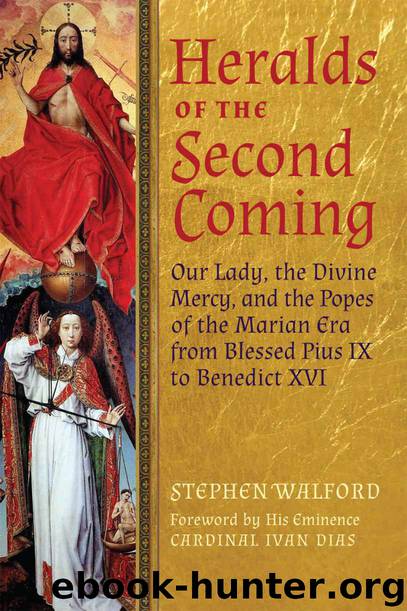Heralds of the Second Coming: Our Lady, the Divine Mercy, and the Popes of the Marian Era from Blessed Pius IX to Benedict XVI by Stephen Walford

Author:Stephen Walford
Language: eng
Format: mobi
Tags: Religion/Christianity/Catholic
Publisher: Angelico Press
Published: 2013-05-31T16:00:00+00:00
The pope gave this interpretation on his relationship with the spreading of the Divine Mercy devotion in an Angelus Address at the Sanctuary of Merciful Love at Collevalenza, Italy in 1981:
Right from the beginning of my ministry in St. Peter’s See in Rome, I considered this message my special task. Providence has assigned it to me in the present situation of man, the Church, and the world. It could also be said that precisely this situation assigned that message to me as my task before God, who is Providence, who is inscrutable mystery, the mystery of Love and Truth, of Truth and Love.6
Many years later, while visiting the Shrine of Divine Mercy in Poland he returned to the theme:
The message of Divine mercy has always been near and dear to me. It is as if history had inscribed it in the tragic experience of the Second World War. In those difficult years it was a particular support and an inexhaustible source of hope, not only for the people of Krakow but for the entire nation. This was also my personal experience, which I took with me to the See of Peter and which, in a sense, forms the image of this pontificate.7
The encyclical on mercy, although not mentioning the revelations given by the Lord to St. Faustina (probably because her cause for canonization was very far from completion at the time), still took its foundation from the messages. We know this from the statement made by George Weigel in his excellent biography of Pope John Paul II, Witness to Hope:
As Archbishop of Krakow, Wojtyla had defended Sister Faustina when her orthodoxy was being posthumously questioned in Rome, due in large part to a faulty Italian translation of her diary, and had promoted the cause of her beatification. John Paul II, who said that he felt spiritually “very near to Sister Faustina,” had been thinking about her for a long time when he began Dives in Misericordia.8
Download
This site does not store any files on its server. We only index and link to content provided by other sites. Please contact the content providers to delete copyright contents if any and email us, we'll remove relevant links or contents immediately.
Resisting Happiness by Matthew Kelly(3337)
The Social Psychology of Inequality by Unknown(3022)
Day by Elie Wiesel(2781)
Designing Your Life by Bill Burnett(2741)
The Giving Tree by Shel Silverstein(2337)
Human Design by Chetan Parkyn(2068)
Angels of God: The Bible, the Church and the Heavenly Hosts by Mike Aquilina(1965)
The Supreme Gift by Paulo Coelho(1963)
Jesus of Nazareth by Joseph Ratzinger(1811)
Hostage to the Devil by Malachi Martin(1802)
Augustine: Conversions to Confessions by Robin Lane Fox(1770)
7 Secrets of Divine Mercy by Vinny Flynn(1741)
Dark Mysteries of the Vatican by H. Paul Jeffers(1718)
The Vatican Pimpernel by Brian Fleming(1700)
St. Thomas Aquinas by G. K. Chesterton(1634)
Saints & Angels by Doreen Virtue(1604)
The Ratline by Philippe Sands(1572)
My Daily Catholic Bible, NABRE by Thigpen Edited by Dr. Paul(1500)
Called to Life by Jacques Philippe(1478)
